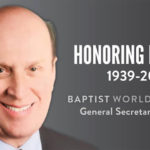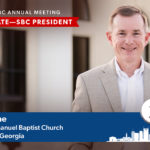DALLAS—The Christian call to pursue just peace in the midst of violence and injustice demands “kingdom courage,” Baptist World Alliance General Secretary Elijah Brown told a Dallas Baptist University gathering.
And “kingdom courage” requires Baptists to reject the “idolatry of nationalism” and instead promote “flourishing freedom,” he added.
Baptists at their best—in places like Ukraine, Moldova and Myanmar—demonstrate “kingdom courage and gospel generosity,” said Brown, who delivered the inaugural Baptist Distinctives lecture April 3, sponsored by the DBU Center for Baptist History and Heritage.
Reflections on trip to Ukraine
Brown offered personal reflections from his trip to Ukraine in February 2022, just prior to the Russian invasion. He recalled Baptist leaders in Ukraine planning for an expected invasion by urging churches to stock up on supplies, so they could provide for the needs of internally displaced people.
“Because of that strategic vision, over the first two weeks of the war, more than 600 Baptist churches in Ukraine served as centers of hope that blessed thousands of people,” he said.
A month later, Brown visited Romania, Poland and Moldova. He met with Baptist leaders and government officials regarding their response to the massive influx of Ukrainian refugees, and he listened to the testimonies of displaced Ukrainians.
“We met with those who had lost everything and with people who were driving into active combat zones to rescue civilians caught in the crossfire, churches renting buses and filling them with food, and people … who welcomed into their homes fleeing women and children,” Brown said.
He next returned to Ukraine, filled both with anxiety and with a conviction that “the Lord calls us to enter into the suffering of humanity with the love of Jesus.”
Journey to Russia to promote ‘just peace’
Brown also responded to an invitation to attend the annual meeting of Baptists in Russia and meet with leaders of the Russian government—a trip “no one encouraged,” including the White House.
Sign up for our weekly edition and get all our headlines in your inbox on Thursdays
While his wife Amy did not tell him he could not go to Russia, she insisted he write a letter she could read to advocate for his release in the event he was unjustly imprisoned or kidnapped.
“The call to relationships of just peace supersedes political boundaries,” Brown wrote. “Even when it is difficult—most especially when it is difficult—we must work to maintain relationships. … To travel to Russia in this moment is to follow the call of Jesus to stand in the midst of the tension and be a voice for peace.”
During his week attending the Russian Baptist Congress, Brown met for an hour and a half with Russian governmental leaders. Brown opened his part of the meeting by saying, “The Baptist World Alliance believes this is an unjust invasion, that all hostilities should be stopped, and that you should withdraw all troops immediately and support religious freedom.”
After pressing repeatedly for religious freedom and a just peace, Brown asked if he could pray at the conclusion of the meeting.
God at work in midst of horror
“When I began the flight home, I felt a weight lifting off my body,” he acknowledged. “I knew then how much stress I was carrying. Yet, this is nothing compared to the reality of those who have been most impacted.
“I have not lived in a land pounded with bombs. I have not lived in a paranoid country looking for dissent. I traveled home, while those on the faith front lines—most especially in Ukraine—have been asked to live with kingdom courage.”

Brown recalled the Ukrainian seminary dean who was shot dead and whose body was left on the streets of Bucha. He remembered the Baptist in Mariupol who described his city as being “wiped off the face of the earth,” but who testified, “The Lord is with us, and he is strong.”
He talked about Baptist pastors in eastern Ukraine being told their names were circulated on “kill lists” held by Russian invaders. In occupied areas of Ukraine, he reported, the Gospel of John and the Baptist hymnal were banned as “extremist” materials.
“Yet in the midst of this horrific war, the Lord has been at work,” Brown said. “Across the region, thousands of Baptists have responded with courage and compassion in the name of Jesus Christ.”
Making a difference
Brown praised Baptists in Moldova, Romania and Poland for their ministries to refugees, as well as the work of Ukrainian Baptists in helping internally displaced people. At one point, Baptists in the region collectively were providing 51,000 beds to people forced to flee their homes, he said.
With the help of Texas Baptist Men, one church of about 100 members in Chelm, Poland, housed thousands of refugees and sent 300 tons of humanitarian aid valued at more than $1 million to help the Ukrainian people, he said.
The Baptist World Alliance supplied 10,000 Ukrainian Bibles to the area, and Baptists globally have provided humanitarian support to 1 million displaced people, he reported. In six months, Baptist churches in Ukraine reported 20,000 first-time visitors, recorded 3,000 professions of faith in Christ and ordained 40 new pastors.
“To the many who have given, thank you. Your gifts are making a profound difference,” Brown said. “Please continue to give as generously as you can. There is not a suffering church and a nonsuffering church, but one church. We give as one church to save lives and share the love of Jesus.”
Globally, according to the Baptist Vulnerability Index, one in four worshippers and one in five churches in groups affiliated with the Baptist World Alliance are highly vulnerable to persecution, war, hunger and poverty, he said.
Example of first-century kingdom courage
Baptists around the world are called to exhibit the kind of “kingdom courage” Joseph of Arimathea and Nicodemus displayed at the time of Jesus’ crucifixion, Brown said.
Those two men—prominent Jewish leaders who were “secret disciples” of Jesus during his public ministry—boldly identified with Jesus at his death by claiming his body for burial. Luke’s Gospel particularly identifies Joseph as one who was “waiting expectantly for the kingdom of God.”
Joseph and Nicodemus “found life in the face of death and stood for justice in the face of government, religious and social opposition,” he said. They “publicly stood for Jesus against the politics of violence and hate” that conspired to kill Jesus, he noted.
Brown drew three lessons from their example:
-
“The kingdom of God is not built with nationalism that weds religious and political identity. … The kingdom of God is not built by nationalism, including Christian nationalism,” he said.
“The church is not saved by those who wield political power in the name of protecting the values of the church. The gospel is not advanced by demonizing and violently threatening those with different political views, no matter how disingenuous or damaging they are perceived to be.
“The mission of God is not advanced by the lust for power in this world, the appeal to fear, the promulgation of dishonesty, the protection provided by the state or the idolatry of nationalism. These are not the fruit of the Spirit.”
Brown offered the sobering reflection that in the past three decades, every recognized genocide has been led and encouraged by people espousing one faith or another.
Russia offers an extreme example of Christian nationalism, where the national Orthodox Church has blessed the army that invaded Ukraine and hailed military casualties as martyrs, he noted.
“Why are people of faith so often at the forefront of christening and championing violence?” Brown asked. “Why do so many people of faith bless the bullet, exalt the missile, extol nuclear arms, sanctify invasion and, if need be, pick up the sword and participate in genocide themselves?”
Rather than true faith, their actions often represent the pursuit of power and a “xenophobic nationalism” wrapped in a cloak of religion, he said.
In contrast, Christians must build peace “built on the disruptive power of the fruit of the Spirit,” he asserted.
“The antidote to nationalism is religious freedom. … Kingdom courage works for religious freedom for all people of all faiths or no faith, best advanced by the separation of church and state,” Brown said.
-
“The kingdom of God is not maintained by ethnocentrism and racial identity.”
The New Testament teaches God’s kingdom consists of people of every race, tribe and tongue, Brown noted.
“In the midst of change, there is an ease to appealing to yesterday and a false sense of security that can be created by maintaining racial stereotypes or preferences. This is not the way of kingdom courage and kingdom missiology,” he said.
From tribal violence in the Middle Belt of Nigeria, to the oppression of Aborigines in Australia, to hostility toward refugees in Europe, to environmental destruction of native lands in Latin America, to racial injustice and discrimination in the United States, racism and ethnocentrism create disharmony, he observed.
“Some have allowed a kingdom vision of flourishing freedom to give way to the idols of nationalism, where racism is often framed in concepts of safety and security,” Brown said.
Christians are called to be ambassadors for “restorative racial justice” and to be “reconciled reconcilers,” he noted.
“For four centuries, the best of our Baptist tradition has afforded equality to all in terms of dignity, worth and human rights,” he said, urging Baptists to “celebrate diversity” within the church.
“Let us trade the lie of inherent superiority for the truthful freedom of inherent co-dignity,” Brown said. “The antidote to racism is flourishing freedom that embraces restorative justice in God’s multiethnic church.”
-
“The kingdom of God is not advanced with the refusal to engage.”
Christians must not follow the example of Pilate, who thought he could escape responsibility by washing his hands of the blood of Jesus.
Rather, kingdom-focused Christians must answer the “call to work for justice” and to stand with the vulnerable who face religious, societal and governmental opposition, Brown asserted.
Furthermore, he said, global Baptists must share the gospel message with those who never have heard it.
“Every Baptist is a missionary,” he said, calling on Baptists to face the challenge of unreached people groups with “kingdom courage.”
















We seek to connect God’s story and God’s people around the world. To learn more about God’s story, click here.
Send comments and feedback to Eric Black, our editor. For comments to be published, please specify “letter to the editor.” Maximum length for publication is 300 words.